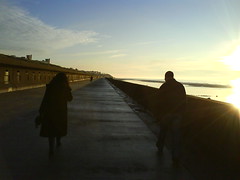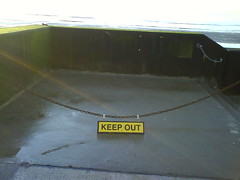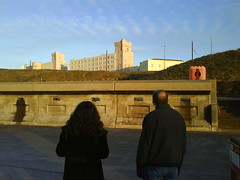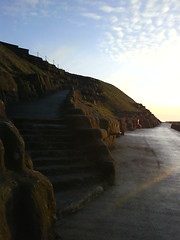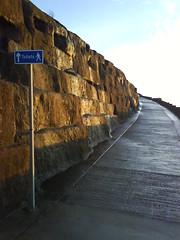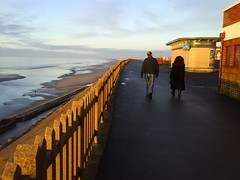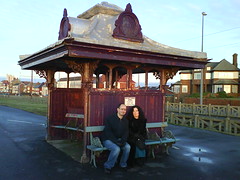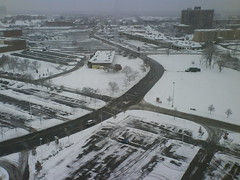The 13-part TV series is from the same stable as landmark BBC series Civilisation and The Ascent of Man. It's an effective use of the small number of colour TV cameras; like the landmarks shows today that show off high definition. Cooke had already spent 40 years explaining the States to the Brits. The BBC radio programme Letter From America (so much good stuff on that site) ran from March 1946 to 20 February, 2004 – there’s a deluxe hardback of the best of his letters, and various other collections, but the whole damn lot is going to be put online by the University of East Anglia. Hooray!
So this is an ex-pat’s view of his adopted home. The first episode covers Cooke’s own passion for the country, the places he visited when he first arrived, the music and vibe that so wowed him. There’s no doubt he’s got it bad… And that flavours a lot of what follows.
The next eleven episodes tell the history of the country. Though Cooke starts with the first people to arrive from the East, things really get going with the arrival of Chris Columbus and then the empires of Spain and France. Episode three is about the British taking charge of their territory, and the first clamour for independence.
Cooke then follows the efforts of these nascent Americans to achieve in practice the promise of their famous declaration: the self-evident equality of all men, the life and liberty and happiness. Note it is “happiness” not “profit”; much of Cooke’s story of America is about inequality, success and enrichment at the expense of others.
Cooke admits his love for the Supreme Court as – more often than not – the defender of the little guy and thus of the American dream, that anyone can make it so long as they’re prepared to work. Cooke’s villains are those who ignore the Supreme Court, his crises when they get a decision wrong. The nation we know today, Cooke argues, is the product of the Supreme Court having to intercede: “No, this is what America is...”
The American system of checks and balances is interesting because, I’d argue, it looks backward. Everything is referred to the original, 18th century constitution and its 27 amendments. (Cooke covers the first 10 tweaks (the “Bill of Rights”) in some detail, but then rather speaks of the constitution as unchangeable monolith.)
For example, Americans today have the right to bear arms because of lines written by James Madison in 1789 and ratified by three quarters of the 14 then-existent States on 15 December 1791. Imagine our own gun laws being based on people’s habits in the year that Mozart died and Charles Babbage born; so many of our assumptions about the pursuit of life, liberty and happiness have completely changed since then.
As Cooke later argues in the penultimate episode of the series, the Second Amendment sought to prevent the US having its own standing army. The newly independent Americans feared creating a tyrant of their own, one with soldiers to back him up. But, at risk from pirates and Indians and each other, early Americans had to be ready to defend their homes at a minute’s notice. Now they have a standing army – and police force and everything else – haven’t they lost that excuse?
There are those who want a Bill of Rights for the UK, who argue we should have a written constitution like the US. But we have a written constitution; it’s just all of it – every act of law, and the precedent of every decision in a court room. (Madison himself was against a Bill of Rights for that reason and some others.) Ours is a constantly developing system of prohibitions: you’re free to do anything that’s not specifically banned or limited.
One of my history teachers argued that ours is, at least in principle, a much freer system. My understanding is that the reason we have so many laws and amendments is because of people (not always intentionally) abusing loopholes in the law – or wanting some prohibition relaxed. The latter is interesting for reasons I’ll come back to. But as Madison observed, if we only behaved better we’d not need a Government watching us.
“If men were angels, no government would be necessary. If angels were to govern men, neither external nor internal controls on government would be necessary.”A few articles on Cooke I've read criticise him for not really proving the darker side of the US, for being such an establishment yes-man. I think that's most telling when he talks about segregation. When Cooke arrived in the US, he says, he found the racial divide very difficult. He argues – I think not very convincingly – that his winces were no different to his American friends wincing at British “norms” such as sending young kids to boarding school.James Madison, The Structure of the Government Must Furnish the Proper Checks and Balances Between the Different Departments, The Federalist #51, 6 February 1788.
Yet episode six, “Gone West”, is unflinching in its horror at the treatment of the native Americans, and episode seven, “A Firebell in the Night” concisely explains the issues of slavery, the Civil War and its legacy today.
It's true he doesn't really explore the racial clashes of the post-war period, and he glosses over the assassinations of both Kennedys despite having been in the room in 1968.
“There was a head on the floor, streaming blood and somebody put a Kennedy boater under it and the blood trickled down like chocolate sauce on an ice cake. There were flash lights by now and the button eyes of Ethel Kennedy turned to cinders. She was slapping a young man and he was saying "Listen lady, I'm hurt too" - and down on the greasy floor was a huddle of clothes and staring out of it the face of Bobby Kennedy, like the stone face of a child, lying on a cathedral tomb.”But this series isn't about what is wrong with America, but how often it has been right, and how its national character has been hard won. There's the adversity of the early settlements and trails, the need for Nietzschean will against the enormous odds. This creates the myth of the American dream of triumph through effort.Alistair Cooke, Letter from America, 9 June 1968.
This story is brought alive by footage of the places as they are now, by contemporary paintings, sketches, architecture, graffiti. Yet it's hearing the songs of wagon trains and revolution that really bring the story alive.
Then when nature is conquered, it is man-made adversity that must be battled: the astonishing violence of the Wild West. We lose the folk songs in favour of brutal photographs of doubled-up families, living on next to nothing.
Innovations slowly make life better: a steel plough to get through the unrelenting ground, barbed wire to make the cowboys into rangers, the mail-order catalogue to allow even the furthest flung family to get the latest clothes and haircuts. Cooke doesn't say it explicitly, but I felt he was implying that the American people became just as domesticated as their animals.
I'm also a little hesitant about some of the stories Cooke relates – they might have lost him 20 points on QI. There's Sacajawea, the native guide who Cooke relates throwing herself in front of her brother to save Lewis and Clark. Isn't that the same story as Pocahontas? Cooke tells us the Sacajawea lived to be 90 and to bitterly regret how her people had been forcibly dispossessed. This again seems to be disputed.
That dispossession is one of Cooke's examples of the Supreme Court being over-ruled by a villain. When President Andrew Jackson ignores Worcester vs. Georgia, Cooke calls him “imperious”. In fact, the story of America is one of empire: of conquest by France and Spain and then Britain, of 13 states then conquering the West.
Yet at the same time it's an empire of incredible, radical liberalism and tolerance. In many ways America sees itself less as a imperial conqueror as a haven for the world's bullied and oppressed. (Perhaps there's an argument that the US, and Israel, are victims of a cycle of abuse: the bullied growing up to be bullies...)
Cooke explains the astonishment of Jews in the nineteenth century on being able to practice their religion freely. (Until recently, only one race or religion had a word meaning their persecution specifically – pogrom – a signpost of centuries of oppression. Since the 1980s, but especially since 11 September 2001, there's also been islamophobia.)
It wasn't just pogroms that caused the huge emigration to America in the nineteenth century. There were the failed revolutions of 1848, the potato famine in Ireland, the stories of American streets lined with gold that dated back to the time of Cortez.
Cooke visits Ellis Island, at the time of filming derelict and recently gutted by fire, what Cooke calls,
“A frowsy monument to the American habit when something wears out of junking and forgetting it.”He retells the experience of the immigrants, a route visitors can walk themselves today as Ellis Island is a museum. The Dr and I visited on our honeymoon in 2004, stunned that two out of every 10 who’d made the vast trek across the planet to get into this place were sent home – for looking sick or old or useless. US immigration still barks harder than any other sentry post I’ve been through.
What the museum doesn't show is the experience of immigrants once they've succeeded in reaching the mainland. Cooke visits the offices of the Jewish Daily Forward, which has run since 1897 and had a peak circulation of 250,000. Its letters pages speak volumes about the migrant experience: the struggles to learn English, to retain their old identities and religions, to fit in with the locals. Cooke marvels at the Daily Forward still being printed in Yiddish; I found it more strange and alien to see it laid out in chunks of movable type.
The different migrant communities shared the same problems if not the same culture and language. Cooke neatly explains how this shared experience led to a uniquely American style of comedy, the burlesque. He waves an actual slap-stick, explaining that the jokes were all corrupt cops and landlords, lascivious judges, the risks and suffering of the young as they try to make good the promise of their parents. From this shared sense of the little man surviving on his wits, Cooke says, come Keaton and Groucho and WC Fields.
The immigrants also meant cheap labour – and produced a few very rich individuals. Cooke ignores the presidents between Lincoln and Theodore Roosevelt because he doesn't think they actually held any power. Instead it was the business interests that ran the country and dictate policy – an accusation still levelled today.
Roosevelt gunned for the industrialists, but also wanted the immigrants to sign up to a distinct, indivisible American identity, distinct from their mother countries. I'd always been a little spooked by in-your-face American patriotism – the oath of allegiance in schools and public meetings, the heavy presence of the stars and stripes outside people's homes. Who, I thought, are they trying to convince, and of what? But Roosevelt's call for there to be no more “hyphenated Americans” suddenly puts that in context.
And the second generation of immigrants flourished in their new home. Cooke sorts through the index cards, finding the parents of Irving Berlin and Alfonse Capone, sundry judges and political chieftains. He also makes the link between America's toleration and its success over other nations: the German Jewish physicists fleeing Hitler in the 1930s were to ultimately win America the Second World War.
(See also me on what the bloody foreigners have done for us.)
Cooke is fascinating on the Wall Street Crash of 1928, on the frippery and greed immediately before it and the lie it was built on. He describes the problem brilliantly as,
“A mountain of credit on a molehill of actual money”,and explains that in those primitive days there was none of the regulation and scrutiny that would stop such a thing happening today (!). (It's also eerie seeing footage throughout the series of the New York skyline, with the World Trade Center still being built.)
Those who ignore history are damned to repeat it. It strikes me that those bankers and money men who've fought so hard to de-regulate the markets are little different from teenagers hosting a party while their parents are away. They don't want rules or conditions either. After all, what can possibly go wrong?
But what can history teach us on how to get out of the present financial mess? Well, new president Franklin Roosevelt brought in a strict regime of what Cooke calls “national socialism”, ending speculation with other people's money for a whole two years (until the Supreme Court over-ruled him). There were huge public works like the Hoover Dam – but Cooke acknowledges it wasn't this Stalinist programme that solved the problem, it was the outbreak of world war.
As detailed above, for its first 160 years, the US had a “dogged distrust” of a standing army. The standing army in 1941, says Cooke, was no larger than Sweden’s. There’s comic footage of what look like boy scouts scampering through the woods, which Cooke starkly contrasts with the vicious efficiency of German Blitzkrieg.
The war changed everything. Cooke rather sees it as the apotheosis of American will, American ingenuity, American tolerance for the Jews so badly treated everywhere else. America bails out the UK and liberates France and Germany, turning the tables on its mother countries. The hydrogen bomb secured its position over the whole world.
Between 1945 and 1953 America’s nuclear toys went unrivalled. This unique position maybe explains their incredible paranoia and witch hunts – though as Cooke says they might as well have tried to keep secret the laws of gravity. The American arsenal and war machine is vital to the US economy, Cooke seems to say, and vital to its modern identity.
The penultimate episode of the series, as Cooke visits the men on duty in a nuclear bunker, is utterly chilling. We watch the nerdy young men who can bring about the end of the world going about their routine. Cooke explains they wear pistols to shoot each other should they start to act strange. He hopes the systems will not become too coolly automated, that there might always be some key human component who’ll be able to have second thoughts…
The last episode seems to begin with a prologue from some years later – perhaps after Reagan has been elected. Cooke admits his predictions in 1972 have not all come to pass, and flavours what follows. He ties his history together, comparing the America of the early 1970s to the founding dreams and ideology of the late 18th century.
It’s fascinating; he’s sure the self-sufficient communes will be part of the future, that America will be living the Good Life, that cities will be left far behind. He shows footage of a young Jesse Jackson, and then tells us of his amazement that – so soon after such violence and deep-rooted segregation – there are now black mayors and senators.
I found Cooke discussing the race question while stood in Chicago deeply strange: he'd finished writing his letters in 2004 just too soon to have mentioned Barack Hussein Obama. I wonder what Cooke would have made of him.
It's a love-letter to a nation, and I found it compelling. The English, Cooke says, often think of Americans as “an Englishman gone wrong.” His series shows how wrong we are.





